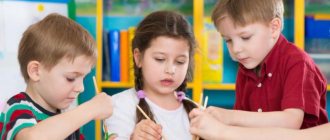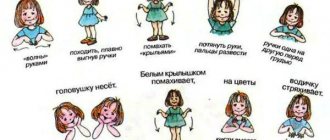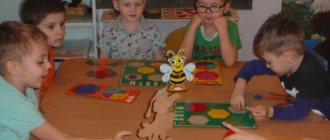Card index of conversations in the middle group
Usually thematic blocks are included in the outline:
- Day of Knowledge;
- autumn;
- well-being;
- professions;
- safety;
- health;
- kindness;
Dialogue in preschool educational institutions
- family;
- my city;
- transport;
- famous people;
- culture;
- emotions;
- New Year;
- nature;
- boys and girls;
- defenders of the fatherland, military specialties;
New Year theme
- design;
- Easter;
- guests;
- Mother;
- space;
- folk art;
- spring, winter;
- Victory Day;
- Emotional behavior;
- sport;
- morning;
- Street;
- summer.
Note! All these topics are related to the events that children experience and the environment in which they grow up.
Conversation with children of the middle group: life safety
The main goal of the dialogue on life safety is to explain to children the fact that even simple things can be fraught with danger and must be handled with care. When talking with children, you should pay attention to dangerous objects surrounding children at home. Among these dangers are:
- The presence of piercing and cutting objects in large quantities in everyday life (scissors, needles, pins, etc.). The emphasis should be on the fact that all these things must be stored in the proper place.
- Availability of household chemicals. It is important to convey to children that although powders, insect repellents, dishwashing detergents and other household chemicals may often be attractively packaged, they should not be eaten.
- Medications. The goal is to explain to children that they need to take pills only when there is a medical indication. In everyday life, the use of medications (even beautiful tablets and tasty syrups) can adversely affect your health.
- Electrical appliances. Common household appliances may cause fire or electric shock.
During this conversation, we can mention flammable Christmas tree decorations and garlands.
Also, during the conversation on life safety, the importance of such special services as ambulance, police and firefighters should be touched upon. It is necessary to clearly explain the purpose of each of them:
- ambulance - a doctor is required;
- firefighters - the fire is raging;
- police - we need to protect life in a dangerous situation and ensure law and order.
Note! Fires need to be addressed as a separate topic in this series. Children need to be told about the causes of fires and the actions that need to be taken in an emergency. Explain that you cannot play with fire, and this can lead to very sad consequences.
Conversation about mother in the middle group
Mom is the most important person in a child’s life. In childhood, you need to develop a sense of respect for women, love for your family and friends. It is advisable to organize such a dialogue on holidays such as Mother’s Day or International Women’s Day.
During such conversations, children should be given a lot of interaction:
- tell poems about mommy;
- call mothers with kind and gentle words;
- offer options for helping mom.
Talk about mom
All this can be combined with numbers and skits that children rehearse for their mothers and then show them. This will help children learn to demonstrate their feelings and receive maternal warmth and care.
Conversation about professions in the middle group
During such a conversation, the main goal is to form and consolidate children’s ideas about various professions. Particular attention should be paid to such professions as:
- teachers;
- doctors;
- engineers;
- sellers and others.
All about cognitive development in preschool educational institutions
This conversation is most effective in the format of an interactive journey through the stations. At each station, children get to know the specifics of one profession in a playful way. During their stay at the station, the children try to guess what kind of profession the teacher is presenting to them. Then they talk about what the profession does.
Note! You can organize a small master class, during which children will immerse themselves in the atmosphere of the profession.
A particularly important element is the discussion of professions in the middle group. At this stage, the student already understands what adults do. He shows interest in their activities. Through the study of professions, the child forms his ideas about the world, learns to respect and appreciate the work of other people. In addition, this is the first stage of vocational guidance, at which the child shows individual inclinations and interests.
Conversations about health in the middle group
The purpose of the conversation should be to develop children’s initial skills about protecting life and health. Children must learn to draw conclusions about the safety of a particular action.
It is necessary to develop in them a sense of mutual assistance and mutual assistance. During the conversation, it is worth determining exactly how children understand the very concept of “health” and conveying that health is human wealth. It is important to discuss with children those situations in which they can harm their health.
Note! In a conversation about health, it is worth including a minute of physical education and a discussion of nutrition culture. After all, the formation of a healthy body depends on a balanced diet.c
Another important aspect to consider during the discussions in this unit is personal hygiene. An excellent tool for this is the work “Moidodyr”.
Transport topics
Topic "Transport" in the middle group
A conversation on this topic is intended to help systematize children’s ideas regarding the methods and characteristics of people’s movement.
You need to talk to your children about several main aspects of this topic:
- highlight the purposes for which transport is used;
- present a classification of modes of transport.
Pictures, videos, presentations and toys can be used as supporting material.
Note! Demonstration material must be clearly prepared.
Conversation about pets in the middle group
The main goals of conducting such a conversation from a cognitive point of view:
- deepen children's knowledge about pets;
- to form the concept of “pets” in the minds of the younger generation;
- to cultivate love and the ability to care for our smaller brothers.
This lesson involves examining illustrative material, discussing the basic habits of pets, their benefits and purpose, as well as the rules for handling pets. Children can be told interesting facts about each pet to capture their attention and begin to develop an interest in biology.
Conversations on healthy lifestyle in the middle group
This series of conversations is closely intertwined with conversations about health. During them, children are taught the basics of biology - the human body is studied, children get acquainted with the main functions and organs of a person, and try to understand why each of them is needed. Also, in a playful form, material is presented about those factors that have a detrimental effect on human health.
The purpose of the classes is to develop in the student the value of a healthy lifestyle, nutritional culture, and sports.
Family theme
Conversations about family in the middle group
Children should receive a formed idea of what a family is and how valuable it is in everyone’s life.
Games for developing memory and attention in children
It is important to convey to the little ones that families are different, large and small. At the same time, it is the family that is the support in every person’s life.
During these conversations, as an interactive activity, you can invite children to look at photographs and write short stories about their families. Such an activity will favor the development of the speech apparatus and the ability to express thoughts coherently.
Note! You can supplement the lesson by reading and learning short works about family and relatives. This will also have a beneficial effect on the development of children's memory.
Conversations about safety in the middle group
They need to be done with children regularly.
During such conversations, you need to touch on several blocks of topics:
- weather conditions (ice, rain, extreme cold or heat);
- traffic rules (traffic rules);
- plants, mushrooms and animals (insects, dogs, poisonous mushrooms, etc.).
Such conversations are best conducted in the format of situational discussion. This will help immerse children in the real world and help them orient themselves in the future. Children will analyze a specific situation, which will develop critical thinking. You can supplement the conversation with demonstration material, coloring/drawing, as well as poems and sayings.
Children's conversations about autumn in the middle group
A conversation about autumn will teach children to see the connection between the length of daylight hours, climate indicators, as well as the behavior of animals and plants. Such a conversation will contribute to the formation of a caring attitude towards flora and fauna. Will teach you to distinguish the autumn months from the spring (March, April, May) and winter (December, January and February).
This is one of the most favorable conversation topics for introducing a student to literature. There are a huge number of easy-to-understand poems that children can learn by heart. Also, using autumn pictures, you can teach children to compose their own texts, which has a beneficial effect on children’s speech culture.
Summary of an introductory conversation for children of middle preschool age on the topic “Do good”
Summary of the introductory conversation. My name is Romanenkova Olga Nikolaevna, I have been working as a kindergarten teacher since 1993, I went to this kindergarten when I was little. I was very interested in participating in your competition “Lessons of Goodness”, for the reason that you decided to involve not only schoolchildren, but also preschool children in the topic of charity. This is very important, many believe that preschoolers will not understand conversations about charity. To many, this topic seems complicated, inaccessible to a child, and, moreover, even unnecessary! Like, it’s too early for my baby to know about unpleasant things; when he’s at least old enough to go to school, he’ll see enough of this. Therefore, such mothers and fathers deliberately avoid this issue. If you show your child an example, tell him how useful and important it is, demonstrate how he can participate in this, the support of other people will become absolutely natural and normal for him in adulthood.
I believe that the most important thing is not only to teach children to count and read, but it is also necessary to develop moral qualities. In our garden they pay a lot of attention to patriotic education, for many years our garden worked in an artistic and aesthetic direction, a lot of attention was always paid to working with the family and interacting with the families of pupils. And selfless care for others, sympathy and empathy, mercy and kindness are very important qualities without which a real personality cannot be formed.
Having learned about your competition, I decided to take part in it. Now I have a middle group (children 4-5 years old) And I would like to start introducing my children to charity, already from the middle group. And continue to expand children’s knowledge in the future. The most important thing is not to be afraid that children will not understand or will reject the idea of helping other children or older people. Children are very responsive and merciful: if you explain why people today need support and guide them correctly, they will be sincerely willing to put their efforts into this. At the same time, if you start small, from early preschool age, for example, from the middle group, then by a more or less conscious period they will be ready for more - perhaps already in adolescence, they will show interest in volunteering. And such people should understand perfectly what is good and what is bad, and always come to the aid of anyone who needs it. After all, mutual assistance in many ways makes us all human.
I decided that it was necessary to start introducing middle-aged children to the concept of charity with a conversation. The first conversation is introductory.
Summary of an introductory conversation for children of middle preschool age on the topic “Do good”
Objectives: To introduce children to the concept of charity.
Objectives: To instill in children a desire to help children and people in need. To instill in children love and compassion for others, a desire to help in difficult situations.
Progress of the conversation
Children stand in a circle.
Educator: Guys, today I want to talk to you about the good that we can give to others! Now look at each other, smile. Look how bright it is around you because of your smiles! Take the ball and passing it to each other, remember all the kind words and say them to each other.
Children pass the ball to each other, saying kind words.
Educator : Well done! How many kind words did you remember? Sit down on the carpet.
The teacher distributes white circles to the children. There is a box of pencils on the carpet.
Educator : Now think and paint over the “lanterns” of your mood: if you are in a joyful mood, paint the “flashlight” yellow, and if you are in a sad mood, gray.
Children paint over the "lanterns"
Educator : Have everyone painted over the “lanterns”? What color is your “flashlight”? Why did you paint it yellow (gray)?
Children's answers.
Educator : The world in which we live is wonderful, unique, diverse and beautiful. You and I are a part of this world and it depends on us what it will be like: sunny, warm or cloudy and cold.
Today I want to tell you what qualities a kind person who is able to help other people should have and let’s talk about the noble deeds of people.
The teacher reads a poem:
The house is busy with good deeds, Kindness quietly walks around the apartment, It’s a good morning for us, Good afternoon and good hour, Good evening, good night, It was good yesterday. And where, you ask, is there so much kindness in the house?
Educator : Did you like the poem? How do you understand the word “kind”?
Children's answers.
Educator: Who might need our help?
Children's answers.
Educator: How can you help other people?
Children's answers.
Educator: Guys, what good deeds can you do to help others?
Children's answers.
Educator: Is it possible to force a person to be kind? Ponder.
Children's answers.
Educator: Each of you has a small piece of kindness. A kind person is one who loves people and helps them. The love of a kind person, his help warms like the rays of the sun.
Don't stand by indifferently when someone is in trouble. You need to rush to the rescue at any moment, always. And if your kindness and your smile help someone, you are happy that the day was not lived in vain, that the years you live are not in vain!
There's a knock on the door.
Educator: Oh, guys, do you hear someone coming to visit us?
Doctor Pilyulkin enters.
Doctor Pilyulkin: Hello guys! (children say hello) My name is Doctor Pilyulkin! What is so interesting you are talking about?
Children's answers.
Doctor Pilyulkin: Guys, you are lucky, we have parents who take care of you, we have friends. When you get sick, your mother always comes to your aid, treats you, and consoles you. Do you know that there are children who have no parents and no one to feel sorry for them.
Children's answers.
Dr. Pilyulkin: There are children living next to us who need help. Orphans are nobody's business. They don’t have parents, a mother who can caress you when you’re bad, sad, when you’re sick. They need kindness and help, care.
And we should not remain indifferent. There is such a word as charity. Do any of you know what it means?
Children's answers.
Dr. Pilyulkin: Charity itself is a word, as if it consists of two words - the word good - which is different, we call it good and the word create, and in another way we say do. And you can say that charity means doing good, but to make it clearer to you, I’ll say this, charity means doing good to people! This does not mean that it is necessary to give money, although this can be done, say a kind word, give a smile, provide a person with any help. This also means doing good to people. This is done when you want to say something to each other, support, make each other happy.
Help is not only material - sometimes people need moral support, to be supported, understood, or physical strength.
Today I invite you to also take part in a charity event; next to your kindergarten there is a boarding school for orphans. And you can help them. Guys today, you talked a lot about how you can help such children. What would you like to do for them?
Children's answers.
Dr. Pilyulkin: You can collect a parcel for a children's boarding school: books, toys, educational games, clothes and much more.
Educator: Guys, we can ask your parents to help us collect and take the parcel to a children's boarding school, next to our garden.
Do you agree?
Children's answers.
Doctor Pilyulkin: Guys, do you want to come up with a name for our charity event? (children's answers)
Educator : Doctor Pilyulkin, guys, since we are just learning to do good, let’s call the name of our action “Learn to do good”?
Children's answers.
Dr. Pilyulkin : Great title and it’s clear what you will be doing. Unfortunately, it’s time for me to leave. I wish you to collect a package for the guys. I know they will be very grateful to you. Goodbye, guys! See you again!
Doctor Pilyulkin leaves.
Educator: (reflection) We had a very serious conversation, it probably touched your souls, perhaps you will change your attitude towards your actions. I would like you to understand that we need to provide help to those who need it. But the help should be unnoticeable, selfless. If you really do a good deed for people, you shouldn’t shout about how noble you are. I want to wish you: be more attentive to people, try to understand them, provide all possible help at the right moment, but don’t be proud of it, rejoice yourself, make others happy.
I wish you well, Good night until the morning. I wish everyone good dreams, good deeds and kind words. Will the road lead you away from your beloved threshold, Let someone tell you: “Good hour and good journey!” I wish that people would have more fun with you, that you would look at people with kind eyes.
Educator : Guys, today tell your parents what you learned about and invite them to help the children from the orphanage. We will collect a package for the guys and ask one of the dads to carry it. We will not only do a good deed with you, we will be able to say that for the first time we took part in a charity event, helping orphans.
END!
In the future, I want to try to develop a small system of lessons that will contain more complex material, in accordance with the age and knowledge of the children.
Morning conversations in the middle group
In accordance with the Federal State Educational Standard, a conversation with children on a given topic is the most effective educational way of interacting with a child. Morning conversation in kindergarten is a certain stage of preparing the child for school everyday life.
Note! The conversation should be prepared in such a way that the child, on the one hand, receives initial knowledge, and, on the other hand, goes through the process of socialization.
The topics of morning conversations and lessons may vary. However, at the moment there are card indexes with recommended topics for discussion.
Consideration of the situation in the preschool educational institution



